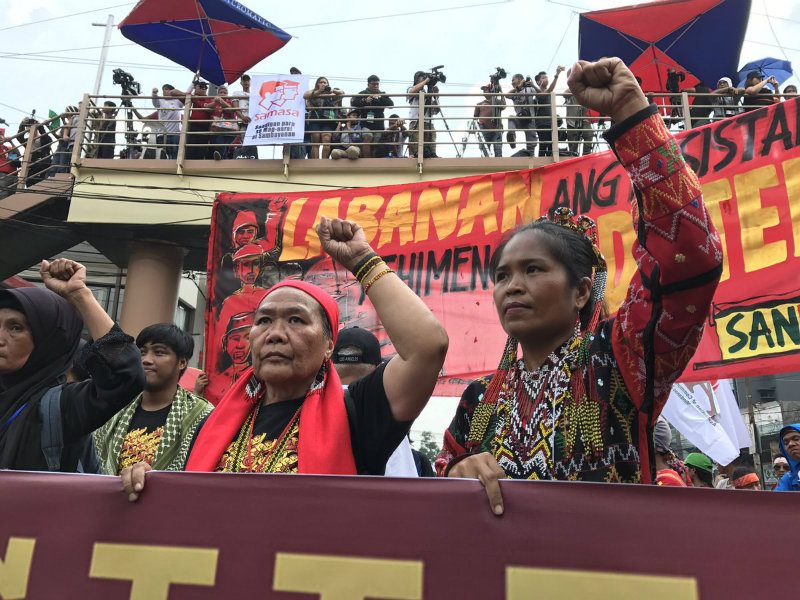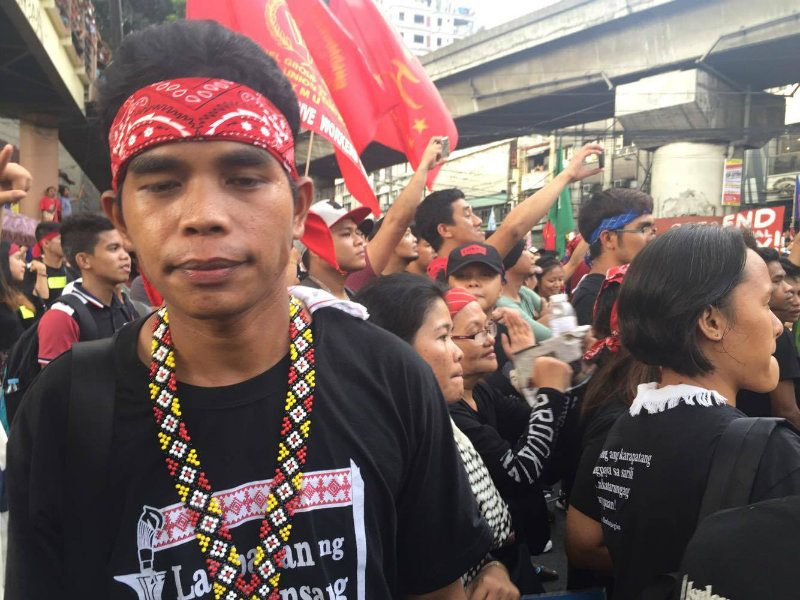SUMMARY
This is AI generated summarization, which may have errors. For context, always refer to the full article.

MANILA, Philippines – Opening the program at the protest rally on Mendiola Thursday, September 21, a number of Lumad from Mindanao performed an interpretative dance, where President Rodrigo Duterte, wearing an American flag, is depicted as the enemy.
“Ang panawagan talaga namin dito ay, unang-una, labanan ang rehimen ni Duterte, at dapat nang itigil ang martial law sa Mindanao, at itigil ang pagbobomba sa mga komunidad ng mga Lumad,” Kerlan Fanagel, one of the Lumad leaders who had travelled from Mindanao, said in an interview with Rappler.
(Our call is to fight the Duterte regime. We are calling on him to lift martial law in Mindanao and stop the bombing of Lumad communities.)
At least 2,000 members of the national minority groups was at the Mendiola rally, joining the nation’s remembrance of the 45th anniversary of Marcos’ Martial Law. It was the culminating activity of their annual protest caravan called Lakbayan.
On Thursday afternoon, during President Duterte’s visit to Marawi City, he announced that he would lift martial law in Mindanao once clearing operations were completed. Government troops have launched their final push to end the 4-month-old conflict in the Islamic city, where local terrorists group continue to hold hostages.
Attacks on communities
Fanagel said they brought with them stories of incessant attacks on indigenous peoples and the worsening militarization of schools in their communities since Duterte declared martial law in Mindanao in late May. (READ: LIST: Martial Law 45th anniversary activities, protests)
On Wednesday, September 20, they received reports that the 39th Infantry Batallion dropped bombs on civilians and Lumad communities in Barangay Balite in Magpet, North Cotabato.
“Nakikita namin na sa isang taon palang, ang listahan sa pagpaslang sa mga katutubo at pagbakwit ng mga katutubo ay mas lalong dumarami,” Fanagel said. (In his first year as a president, we’ve seen how the number of the killings and forced evacuation of national minorities have increased.)
One of the Lumads who directly experienced the effects of the reported militarization in their communities is Datu Jimboy. He said he has evacuated his home at San Fernando, Bukidnon, 6 times since Duterte declared martial law in Mindanao.

“Sobra pong mahirap. Akala namin ‘yun na ang katapusan na ng aming buhay kaya kami nag-evacuate sa tapat ng Provincial Capitol. Kitang-kita namin na ang aming mga kabataan ay nakaranas ng matinding gutom,” Jimboy said.
(It was very difficult. We thought it was going to be the end our lives, that was why we decided to evacuate across the Provincial Capitol. We saw first-hand how our children suffered from hunger.)
Jimboy said they decided to join the Lakbayan after the local government failed to help them.
“Dahil sa kawalang ng hustisya sa korte at walang tulong ng gobyerno kaya kami nag-Lakbayan papunta dito,” Jimboy said. (Because we did not receive help from the courts and the government, we decided to join the Lakbayan.)
Remembering Martial Law
According to Fanagel, the experience of Jimboy and other members of national minorities was remniscient of what their elders went through 45 years ago.
“Ang naranasan ng mga katutubo sa Mindanao ay mas pinatindi ang paglabag sa karapatan ng mga katutubo, lalong-lalo nung panahon na idineklara ang Martial Law,” Fanagel said. (What the indigenous peoples in Mindanao experience is more serious violations of their rights, especially since [Duterte] declared martial law.)
In June, the Lumad groups called on Duterte to lift martial law in Mindanao and pull out troops from their communities so the children could return to their schools.
According to them, since the declaration of martial law, soldiers have occupied schools in their communities. They have also supposedly been accused of being members of the communist New People’s Army (NPA) simply because they were taught to read, write, and count.
Mindanao Interfaith Services Foundation Incorporated, a school in the mountains of Davao City, stopped classes after government troops occupied the building. According to Jinky Malibato, an evacuee from Davao, martial law has become an excuse for the military to be unnecessarily violent.
Their plea, however, fell on deaf ears when the Congress approved Duterte’s request to extend martial law to December. – Rappler.com
Add a comment
How does this make you feel?
There are no comments yet. Add your comment to start the conversation.